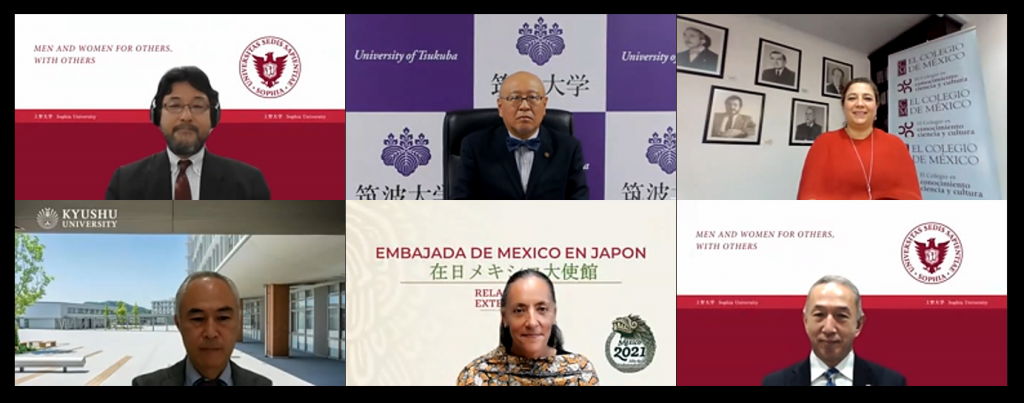Pre-event
Pre-event
5th Japan-Mexico Rectors’ Summit Pre-event
On October 7th (JST) / 6th (CDT), Japan-Mexico Rectors’ Summit pre-event was held online, with around 300 participants including university presidents, vice presidents, faculty members, staff members, and students from both Japan and Mexico. This event was held to build momentum for the upcoming Summit participation, which has been postponed until October 6-7, 2022 from the initially scheduled hosting in 2021, due to the pandemic.

At the beginning of the pre-event, Yoshiaki TERUMICHI, Ph.D. President, Sophia University, delivered an opening remark. He expressed his hopes for exchange of diverse discussion on the topics of issues shared by both Japan and Mexico, ultimately establishing a sense of unity among the higher education community of both countries – despite the unique cultural background and social situation each country has.
After that, presentations were given as follows; “Triple helix (academy-government-industry) Collaboration” by Dr. Kazuo WATANABE, Professor, Faculty of Life and Environmental Sciences, University of Tsukuba , “Women participation in research fields” by Dr. Silvia GIORGULI, President, El Colegio de México, “World University Rankings” by Dr. Takeshi HIROSE, Professor, Top Global University (SHARE) Office, Kyushu University. Unique and interesting approaches were introduced on each topic, and many questions were asked by participants from both countries, indicating the high level of interest.
As the closing remarks, Ms. Melba PRÍA, Ambassador, Embassy of Mexico in Japan touched on the long-standing friendship between Japan and Mexico which continues today for over four centuries, and noted on the Summit as an innovative opportunity to further develop the relationship and solve the challenges both countries face. Lastly, she expressed her hopes for the Summit to be held next year.
For the schedule of pre-event, see below.
Japanese
Spanish
Click here for presentation notes
Triple helix (academy-government-industry) Collaboration
Click here for the Summit flyer
< Schedule >
9:00-11:00AM JST / Thursday, October 7th, 2021
19:00-21:00 PM CDT / Wednesday, October 6th, 2021
Language: Japanese/Spanish
09:00 JST/19:00 CDT – 09:15 JST / 19:15 CDT
◆Opening Remarks (15mins)
Yoshiaki TERUMICHI, Ph.D.
President, Sophia University

09:15 JST / 19:15 CDT – 09:45 JST / 19:45 CDT
◆Session 1: Triple helix (academy-government-industry) Collaboration
(30 mins. Q&A included)
Speaker: Kazuo WATANABE, Ph.D.
Professor, Faculty of Life and Environmental Sciences,
University of Tsukuba

09:45 JST / 19:45 CDT – 10:15 JST / 20:15 CDT
◆Session 2: Women participation in research fields
(30 mins. Q&A included)
Speaker: Silvia GIORGULI, Ph.D.
President, El Colegio de México

10:15 JST / 20:15 CDT – 10:45 JST / 20:45 CDT
◆Session 3: World University Rankings
(30 mins. Q&A included)
Speaker: Takeshi HIROSE, D.Phil.(Oxon)
Professor, Top Global University (SHARE) Office, Kyushu University

10:45 JST / 20:45 CDT – 11:00 JST / 21:00 CDT
◆Closing Remarks (15mins)
H.E. Ms. Melba PRÍA
Ambassador of Mexico to Japan

Moderator: Hiroyuki TANI, Director, Iberoamerican Institute, Sophia University
< Presentation Title, Abstract, and Speaker Biography>
◆Session 1: Triple helix (academy-government-industry) Collaboration
Presentation title: Japan-Mexico Multidisciplinary Partnerships Based on Academia, Public Sector, Civil Societies and Private Industry Collaborations
Abstract:
University of Tsukuba together with its partner Japanese universities have been experiencing multi-sector partnerships among academia, public sector, civil societies and private industry in Mexico. Besides the academic research applications for SDGs, we have been catalyzing empowerment with the partners in Mexico and neighboring countries. The cases are provided with emphasis on agricultural, food, and environmental sectors also on Japanese language & vocational educational sectors.
Kazuo WATANABE is a professor at Tsukuba Plant Innovation Research Center, Univ. of Tsukuba since 2001. He completed Ph.D. at Univ. of Wisconsin-Madison on Plant Breeding & Plant Genetics. At his earlier career he had worked in North and South Americas particularly in Peru and Mexico, and recent activities are at more global, but emphasis with APEC economic zones. He has been working dually on international student activities and research on plant genetics, breeding and genetic resources with biotechnology application with biodiplomacy at UT since 2001.
◆Session 2: Women participation in research fields
Presentation Title: Gains, losses and emerging challenges regarding the participation of Mexican women in higher education
Abstract:
The last decades have seen a rapid growth in the enrollment of Mexican women in higher education showing higher graduation rates than men. Nevertheless, have not been followed by corresponding progress in the participation of women as senior researchers and professors, a greater presence of women in decision-making positions within the universities and an equivalent increase in female labor participation rates. The presentation introduces some ideas of initiatives within the university environment that can reduce gender inequalities.
Silvia E. GIORGULI SAUCEDO, president of El Colegio de México [COLMEX] (2015-present). Furthermore, former director (2009-2015) and professor-researcher (2003–present) of the Center for Demographic, Urban and Environmental Studies, COLMEX, and former president of the Mexican Society of Demography. She studied Sociology at UNAM, a Demography master’s degree at COLMEX, a doctorate in Sociology at Brown University, and a research stay at Stanford University. Her research has focused on: international migration from Mexico to US, transitions to adulthood in Latin America, and the effects of demographic change. She is a member of the Mexican National System of Researchers (CONACYT). In 2018, she received the Horace Mann Medal from Brown University.
◆Session 3: World University Rankings
Presentation title: What reputation management did for Kyushu University: Lessons from hosting QS-APPLE 2019
Abstract:
Since at least the late 1990s, higher education institutions (HEIs) have been vying with one another for talented students, excellent researchers, external funding, and more. Against this backdrop, reputation management (RM) has emerged as a critical undertaking that HEIs can ignore only at their own risk. As part of its internationalization effort, Kyushu University has — since 2014 — endeavored to raise its reputation by actively engaging in RM. Drawing on my experiences as a member of Kyushu U’s RM unit, I will discuss how the university’s hosting of a well-known international convention affected its reputation.
Having been educated at Sophia University (Japan) and the University of Oxford (UK), Takeshi HIROSE is a moral and political philosopher by training. He has, however, made his professional career not as an academic, but rather as an administrator with a specialty in international education. He designed and managed a range of study abroad programmes for higher education institutions both in Japan and the US. He currently works at Kyushu University, a recipient of Japan’s celebrated Top Global University grant, and is heavily involved in the university’s on-going effort to become a global research and education hub. Reflecting his dual interests, his publications are in the areas of higher education and political philosophy.
